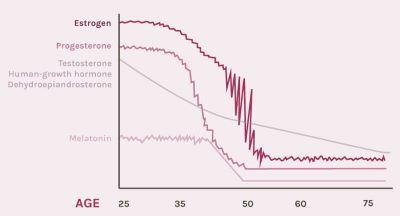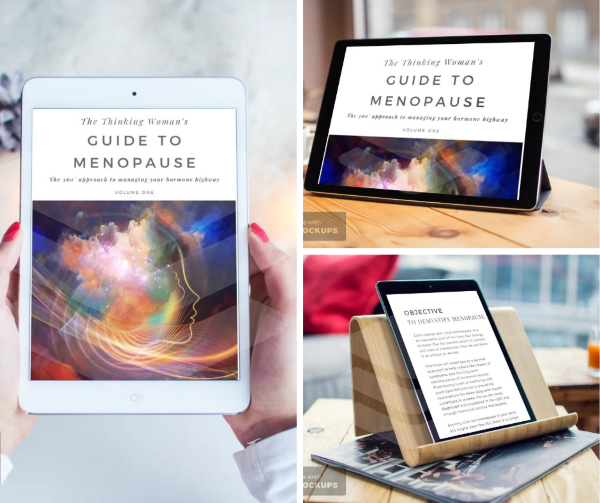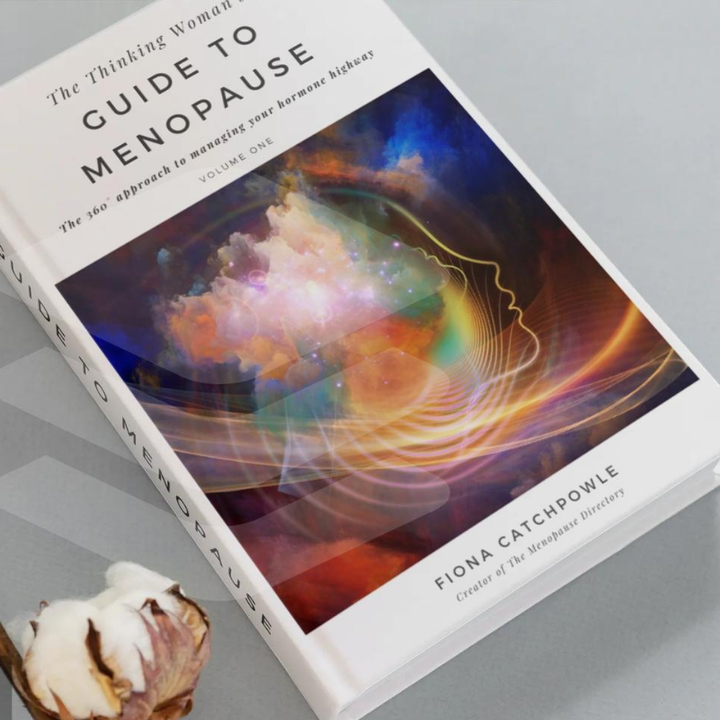Menopause … is it? Am I? No, it can’t be.
Menopause, aka hormonal decline and deficiency, is inevitable for every woman and it’s way more than hot flushes – and more importantly it doesn’t happen overnight and is a gradual process that can start around the age of 40. Whether you notice/experience/acknowledge and symptoms or not is by the by. The process is happening. Your ovaries are heading for retirement and your periods will stop.
You’ve probably heard of a few of the 30 plus symptoms, but what about the consequences?
Maybe you’re not familiar with the long term health challenges we will face as women over the age of 40 and beyond, as our levels of oestrogen & progesterone in particular decline to incredibly low levels compared to what they there were in our early 30s – including health risks such as osteoporosis, heart disease, type 2 diabetes and dementia.
Some commonly known menopausal symptoms are:
- Hot flushes • Night sweats • Mood swings • Tiredness • Poor sleep • Poor concentration • Lack of libido
Less well known symptoms are:
- Heavy periods • Muscle and joint pains • Hair and skin changes (such as dry or itchy skin) • Depression, anxiety and irritability • Memory problems • Panic attacks • Worsening headaches and migraines • Worsening PMS (premenstrual syndrome) • Vaginal dryness, itching or soreness • Pain during sexual intercourse • Urinary symptoms such as increased frequency passing urine
The reason behind the symptoms are the declining hormones shown here

What are the potential risks to your health from the menopause?
Once we have reached our meno-moment and accepted we are perimenopausal (the years prior to your periods stopping) you may think that navigating menopause is simply a case of ‘putting up with’ or ‘battling through the symptoms.
There is no prize or gold medal for struggling with symptoms. No one is going to say well done for being in pain for years, suffering from anxiety or depression, and feeling like you have early onset dementia because of your hormone deficiency. There are many things you can do to manage your menopause such as lifestyle, mobility, nutrition and hormone replacement. I talk about the 360˚ Approach in my eBook in more detail, alongside how it can affect relationships, mental health and how to budget for menopause.

Available as a .pdf which can be read across devices
If symptoms are not enough, there are actual health risks to your body when you go through the menopause.
Osteoporosis
Osteoporosis is much more common after the menopause as oestrogen works to keep your bones strong, so as oestrogen levels fall the bone loss becomes more rapid. Having osteoporosis increases your risk of fracturing (breaking) a bone. This can obviously be painful but can also lead to other problems. Some women with osteoporosis have small fractures in the bones of their spine, which can be very painful and affect your quality of life.
Cardiovascular disease
Cardiovascular disease means disease of your heart and blood vessels, so includes heart attacks and strokes. Your risk of cardiovascular disease increases after the menopause as oestrogen is very important in keeping your blood vessels healthy.
Other diseases
There is an increased risk of osteoarthritis, type 2 diabetes and dementia in some women after their menopause.
Those are the physical consequences. The psychological ones go much deeper. I talk about this in my eBook, but briefly, as we journey through hormonal decline the mechanical challenges wear us down and unless you keep a food & mood diary you may think you are in pain all the time, or always upset, or can’t walk downstairs without pain. Meno Mindset is a huge factor in navigating this part of our lives.
Based on my own personal experiences and knowledge I have gained in the last 4 years about menopause, The Thinking Woman’s Guide to Menopause – Volume 1 is the first in a series to help woman reaching midlife stay sane, know what to do next and learn how to enjoy the process and make the most of it. Knowing what’s best for you is all about informed choices.
Bear in mind that your periods stop around 51 = actual menopause, and if you plan on living until you are 85, you will be postmenopausal for a third of your life. So, menopause management is not just about that 4 or 5 years (maybe 10) that you notice symptoms, it’s really important to know how to thrive mentally and physically for the following 30 years or so.
Backed up by a team of experienced nurses, who are menopause specialists, the information I have collated in Volume 1 talks about a layered approach to living an energetic, confident Change in your life. I was really grateful to receive this fabulous review from Jackie Groundsell, 1230 The Women’s Company –
“October this year sees me celebrate my 73rd birthday! I have osteopenia and take beta blockers for atrial fibrillation – nothing too dramatic health-wise, nor impacting on my lifestyle too much. Ordinarily I don’t broadcast this, but on reading The Menopause Directory book, it got me thinking – big time.
Around 53 (so 20 years ago), I visited my female doctor with what I thought might be menopausal symptoms. She told me that I’d just have to learn to cope with these. I felt uncomfortable in visiting her with this in the first place, now even more so. She didn’t want to put me on HRT, I hasten to add I was in agreement with that – dreadful thing HRT according to the press at the time. I soldered on, additionally managing flooding caused by a lemon-sized cyst on a fallopian tube, which was apparently menopausal. This was monitored with scans for 2 years, medical diagnosis being correct and thankfully nothing to worry about. My Mum had everything “osis” to do with her bones. So there was a good chance I would have something in that direction too – nobody thought about that one then!
What an eye-opener reading TMD was! So much made sense. Possibly, had I taken HRT I may not now have osteopenia, (possibly leading to osteoporosis) nor atrial fibrillation, nor (and this is my diagnosis – beta blockers slow you/blood down) possibly would I have macula degeneration in both eyes.
For reassurance and action, I urge any female approaching/in their 40s to read this little book, packed with facts (not scare-mongery) and such sound sense. How I wish we’d had TMD then. Well done and thank you!”
*****
If you’d like to know more about menopause – myths v facts – you are more than welcome to join my next Menopause Party via Zoom on Wednesday 9th September.
https://www.facebook.com/events/327556248602397
I have a special coupon code for my new book, active from today, for Costa Women members during September – which happens to be Menopause Awareness Month.
Visit this link and when prompted enter code CWSeptember for 50% off
https://themenopausedirectory.com/product/the-thinking-womans-guide-to-menopause/
And last but not least, if you’d like to speak with one of my team of menopause specialist nurses, we are currently offering a free 15 minute discovery phone call so ladies who would like more support and knowledge from a trained professional can have a quick chat and make an informed choice.


